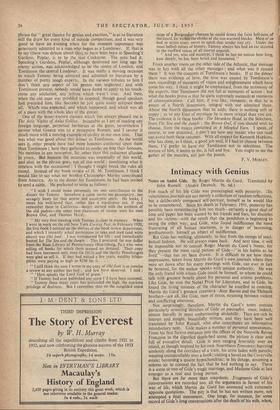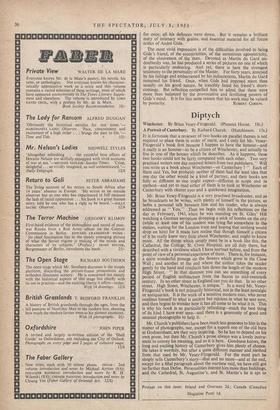Intimacy with Genius
Notes on Andr4 Gide. By Roger Martin du Gard. Translated by John Russell. (Andre Deutsch. 9s. 6d.)
FOR much of his life Gide was preoccupied with posterity. His voluminous journals are not merely a collection of random reflections, but a deliberately composed self-portrait, himself as he would like to be remembered. Since his death in February, 1951, posterity has possibly been remembering him too much—certainly a great deal of time and paper has been wasted by his friends and foes, his disciples and his victims—with the result that the pendulum is beginning to swing the other way; and Gide, who found indifference the most frustrating of all human reactions,, is in danger of becoming, posthumously, himself an object of indifference.
But Gide has nothing, ultimately, to fear from the swings of intel- lectual faShion. He will always come back. And next time, it will be impossible not to consult Roger Martin du Gard's Notes, for they present the most vivid picture of Gide—" in his habits as he lived"—that has yet been drawn. It is difficult to see how these impressions, taken from Martin du Gard's own journals where they were set down after his many meetings with Gide, can ever in fact be betteied, for the author speaks with unique authority. He was the only friend with whom Gide could be himself, to whom he could talk with greatest benefit about his personal and artistic problems. Like Gide, he won the Nobel Prize for Literature, and in Gide, he found the living instance of the character he excelled in creating. Martin du Gard's greatest creatiors —Jean Barois and the Thibault brothers—are all, like Gide, men of stress, straining between violent and conflicting emotions.
Not surprisingly, therefore, Martin du Gard's notes contain particularly revealing sketches of Gide en pantoufles, once, indeed, almost literally in most embarrassing deshabille. They are rich in interest and insight, beautifully written, and they have been well translated by John Russell, who also contributes an informative introductory note. Gide makes a number of personal appearances. From his first furtive entrance into the offices of the Nouvelle Revue Frangaise to the dignified death-bed scene, the picture is clear and full of evocative detail. Gide is seen ranging feverishly over an island, as though inspired by his own Nourritures Terrestres; hurrying aimlessly along the corridors of a train, his arms laden with parcels; weeping uncontrollably over a book; visiting a hovel on the Cuverville estate; becoming a quaint hypochondriac; in his dotage, assuming a solemn air to conceal the fact that he had nothing to say. There is a scene or two of Gide's tragic marriage, and Madame Gide at last emerges as a real and living person.
But there are far more than snapshots. Fragments of Gide's conversations are recorded too, all the arguments in favour of his way of life, which Martin du Gard has answered with extremely apposite quotations. The pity is that he has not written more, not attempted a final assessment. One longs, for instance, for some record of Gide's long conversations after the death of his wife, when, for once, all his defences were down. But it remains a brilliant story of intimacy with genius, and essential material for all future critics of Andre Gide.
The most vivid impression is of the difficulties involved in being Gide 's friend, of the eccentricities, of the monstrous egocentricity, of the elusiveness of the man. Devoted as Martin du Gard un- doubtedly was, he has produced a series of pictures no one of which is particularly endearing. And yet, there is here the strongest testimony to the personality of the Master. For forty years, annoyed by his failings and embarrassed by his indiscretions, Martin du Gard remained his friend. Once, when Gide had imposed more than usually on his good nature, he irascibly listed his friend's short- comings. But reflection compelled him to admit that these were more than balanced by the provocative and fertilizing powers of Gide's mind. It is for this same reason that his work may be valued



























































 Previous page
Previous page